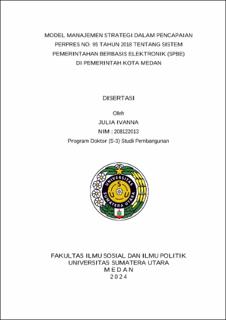Model Manajemen Strategi Dalam Pencapaian Perpres No. 95 Tahun 2018 Tentang Sistem Pemerintahan Berbasis Elektronik (SPBE) di Pemerintah Kota Medan
Strategic Management Model In Achieving Presidential Regulation No. 95 of 2018 Concerning Electronic-Based Government System (SPBE) In Medan City Government

Date
2024Author
Ivanna, Julia
Advisor(s)
Subhilhar
Humaizi
Kusmanto, Heri
Metadata
Show full item recordAbstract
E-Government or Electronic-Based Government System (SPBE) is considered a modern innovation emerging alongside the rapid development of Information and Communication Technology. The purpose of using e-Government is to improve the quality of government services at national and municipal levels in a better, faster, cheaper, more convenient, transparent, efficient, accountable, and easily accessible manner for the community. The Medan City Government has sought to take advantage of the opportunities offered by e-Government, but several recent e- Government projects have not achieved the expected results. One of the reasons for the unsatisfactory e-Government performance is the lack of emphasis on strategic management aspects during the planning and implementation phases. This study has four main objectives. First, to identify and analyze strategic planning in achieving Presidential Regulation No. 95 of 2018 concerning SPBE in the Medan City Government, including analyzing planning documents related to the vision, mission, strategy, and goals of SPBE. Second, to identify and analyze the implementation of strategies in achieving the regulation. Third, to evaluate the strategy's effectiveness in achieving Presidential Regulation No. 95 of 2018 concerning SPBE in the Medan City Government. Fourth, to propose a strategic management model in achieving SPBE in the Medan City Government. Previous research in the field of e-Government tends to focus on development and implementation while neglecting strategic planning and management. Most studies also focus on the national level, while city- and local-level studies remain limited. This research focuses on the strategic planning, implementation, and evaluation phases of e-Government that are often overlooked in previous research. Using a qualitative approach, this research involves observation, interviews, and documentation while adapting to field conditions to ensure that strategic plans align with the actual situation. Responses from relevant parties, including the Communication and Information Agency, Regional Development Planning Agency (Bappeda), Regional Secretariat, and SPBE experts, form the basis for the analysis to identify strategic gaps and propose more effective strategies for achieving SPBE in line with Presidential Regulation No. 95 of 2018.
